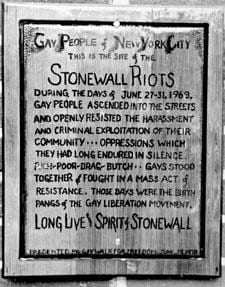By a quirk of fate I walked past the Stonewall Inn twice that early Saturday morning of Jun 28, 1969.
I was then a 22-year-old student at Columbia University. I lived near Columbia on the upper west side near Spanish Harlem but visited the village for late-night cruising at International Stud, where sexual partners were easily found in the backroom.
I went to the Stonewall once or twice but it wasn’t my cup of tea then. It was basically a hustler and drag queen bar, two things that didn’t interest me as a college student looking for hot sex with other young attractive men.
On that fateful night I got off the subway at Sheridan Square right in the heart of the funky village and just across the street from the Stonewall Inn. I was amazed by the number of cop cars outside the bar. Obviously a major police raid was under way. I was a member of the fledgling Columbia Homophile Association (a tepid activist campus group at the time) but I was not a gay activist. I watched in the crowd for a while as police brought out drag queens, hustlers and other patrons, some of whom resisted their arrests. But the cops had yet to take control of the bar.
I went on to the Stud and met a young handsome New York University philosophy student who invited me to his village apartment. I remember that he surprised me by wanting to be aggressively fucked all night long.
In the early morning hours I made my way again to Sheridan Square subway on my way home and was amazed to see that police were still fighting to take control of the Stonewall Inn. I could see cops still dragging patrons from the bar. I watched the surreal scene for half an hour before boarding the subway home.
It was dramatic but not unusual for New York City at that time. We had had many anti-Vietnam-War demonstrations at Columbia that year, complete with police brutality. Stonewall happened just a year after the big “riot” at Columbia in which hundreds of cops bashed and arrested hundreds of students who had occupied many of the university’s buildings.
Student activist leaders like Mark Rudd, the head of the local chapter of Students for a Democratic Society (SDS), regularly urged resistance and revolution in incendiary speeches to students. Rudd once blanketed the campus with flyers urging students to seize the college libraries and distribute the books to the poor people of Harlem.
In the context of the time the raid on the Stonewall Inn didn’t look to me like that big of a deal. Though it was unique to see gays resisting police harassment and arrest; previously only black and antiwar leaders and students seemed to fight with the cops. And the New York Times’ story about the Stonewall incident ran below the fold on the front page the next day. It was not the top story.
There was a lot of debate among gays in New York at the time about the resistance tactics employed at Stonewall. Many believed violence was the wrong strategy but all of us wanted to do something about our oppression and the secretive way we had to lead our lives.
Forty years later it is appalling for me to see Pride Toronto announce that it is an apolitical organization that takes no positions. It is equally amazing to see that gay groups, such as Queers Against Israeli Apartheid (QuAIA), are told they need to seek permission to march.
In the old days one did not need permission to march and because of the revolutionary nature of the liberation movement in ’69 and the ’70s, all groups were allowed to demonstrate and march in gay protests including leathermen, drag queens, hustlers and pederasts. After all we were all oppressed, we were all outsiders and we were all welcome to participate in the protests and demonstrations. And we didn’t ask permission, we just did it.
It is a shame that Pride Toronto has so badly lost touch with its dissident roots. We — even in today’s more tightly regulated LGBT communities — are still outsiders: drag queens, leather queens, hustlers, dykes, trannies, poly people and intergenerational sex enthusiasts and even those against what they perceive as apartheid in Israel and oppression of Palestinians.
We have come a long way but we still identify as outsiders who are not allowed full membership in our communities of sexual liberation. After all we didn’t fight all these decades just to ape heterosexuals and participate in their dysfunctional institutions. We are different: gay, radical and outsiders, not wanting to assimilate into boring heterosexual culture. It seems we still have a long way to go for true gay liberation.
James Dubro has been a Toronto-based author and documentarian on crime for more than three decades. He is a longtime contributor to Xtra.

 Why you can trust Xtra
Why you can trust Xtra


